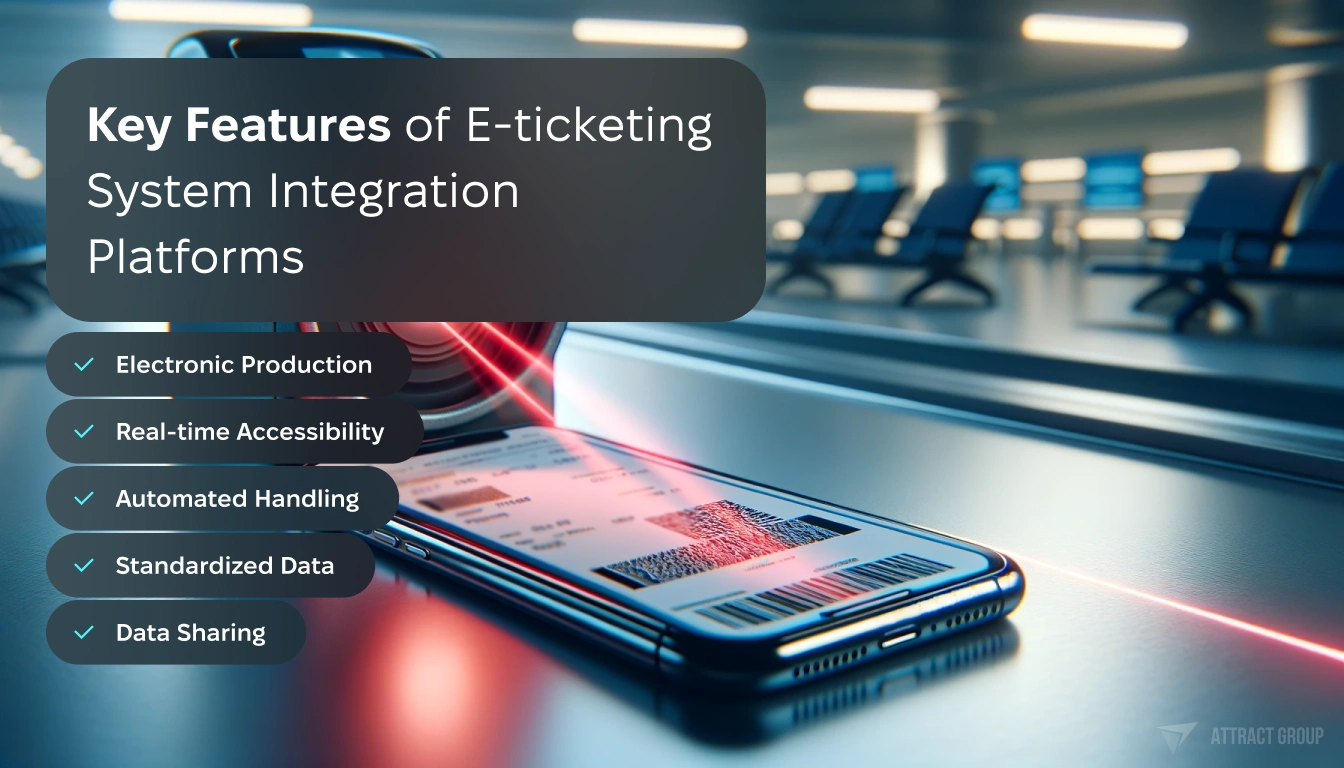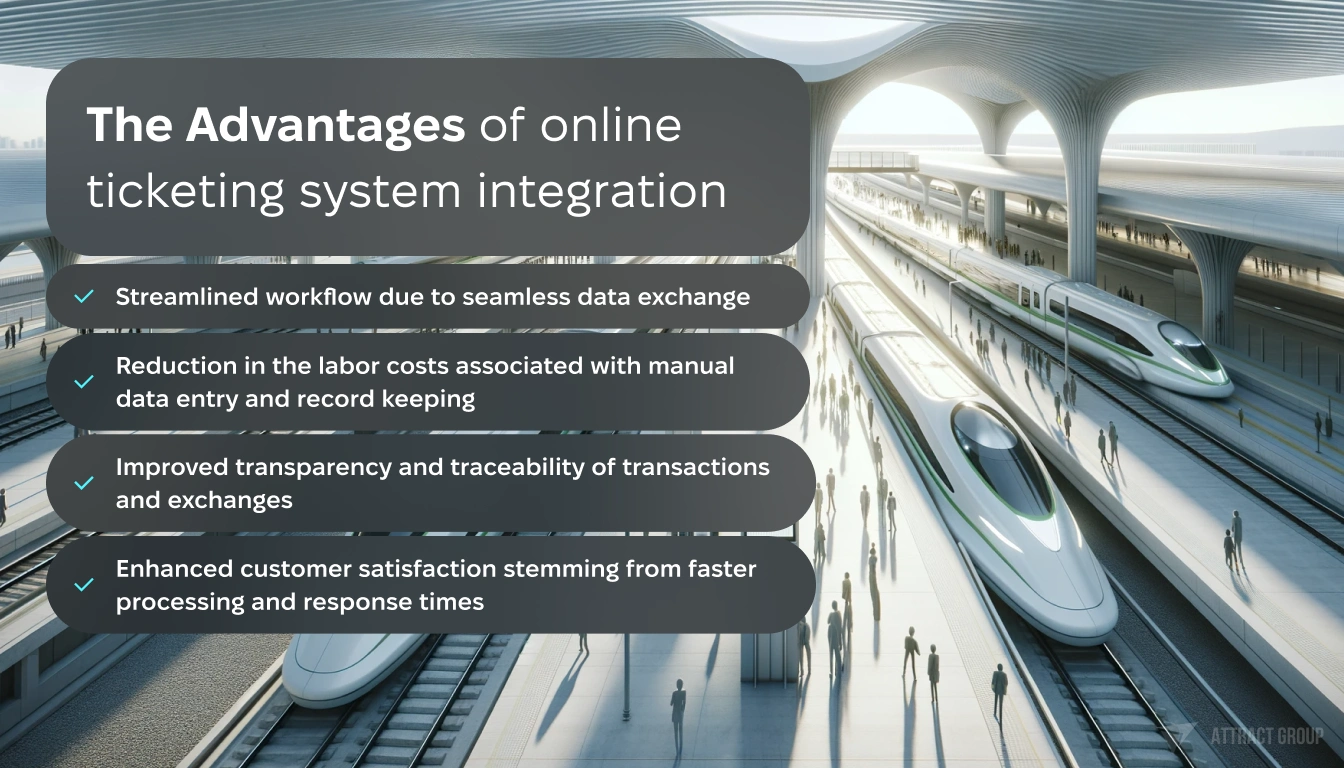Streamline Operations with E-ticketing System Integration in the US
 5 January 2024
5 January 2024? Listen to the Summary of this article in Audio
Within the dynamic landscape of the United States, E-ticketing System Integration is revolutionizing the efficiency of operational workflows across a variety of sectors. As businesses navigate towards a more digital future, the integration of ticketing system solutions has become a vital component in the pursuit of smooth, seamless operations. In an era where data is king, the capability to securely track, exchange, and archive information via advanced ticketing system integration services is not just a luxury – it’s a necessity.
The notion of seamless ticketing system integration resonates with the needs of the modern enterprise, aiming to bolster project safety, quality, and cost-effectiveness. In the US, digitization of conventional paper-based methods through electronic and digital workflows is setting new standards for ticket management system integration, enhancing the accessibility and reliability of crucial operational data.
Key Takeaways
- Adoption of E-ticketing streamlines operational processes, improving safety and data quality.
- Electronic workflows facilitate secure tracking and exchange of ticket data, propelling ticket management system integration.
- Digital transformations in ticketing processes pave the way for consistency in documentation and future reference standards.
- Real-time electronic handling of tickets enhances time efficiency and reduces procedural delays.
- E-ticketing integration services cater to a digital-forward enterprise, optimizing cost savings and elevating project delivery.
Introduction to E-ticketing System Integration
The emergence of E-ticketing System Integration in the US represents a significant leap forward from the conventional practices of the past. This transformative trend points towards a future where integrated ticketing solutions are standard, laying the groundwork for safer, faster, and higher quality operations across a vast array of sectors.

The Evolution of Ticketing Systems in the US
Historically dominated by paper-based processes, the ticketing ecosystem in the United States has undergone a profound transformation. Various state Department of Transportation (DOT) agencies are witnessing the enhanced safety and efficiency that comes with E-ticketing System Integration. Currently, states like Alabama, Florida, Iowa, and seven others have active E-ticketing initiatives, underlining the national move towards digitized ticketing frameworks.
The Role of E-ticketing in Modern Business
Today’s business environment necessitates a high throughput of data that is both accurate and accessible. E-ticketing System Integration plays a pivotal role in this by offering a streamlined method to handle ticket data and enhance operational procedures. The integration of these systems into existing business processes is a testament to their versatility and capacity to drive business efficiency with E-ticketing System Integration.
Overview of E-ticketing System Integration
At its core, E-ticketing System Integration consolidates ticket management from creation to archival into a cohesive platform. The growing demand for such integration reflects the need for solutions that aren’t just about managing tickets but are about creating a harmonious connection between field operations and financial systems. The results are evident: increased safety, streamlined project delivery, and the establishment of a unified ticketing system integration platform.
“Implementing an online ticketing system integration has been a game-changer, significantly enhancing our real-time tracking and standardized data management processes.” – Department of Transportation Official.
- Ticketing system integration solutions offer a modern alternative to paper systems, ushering in a new age of data management in transportation and beyond.
- Seamless ticketing system integration bridges the gap between onsite data collection and backend financial systems, highlighting the interconnectivity that characterizes E-ticketing System Integration in the US.
- Integrated ticketing solutions exhibit potential cost savings and operational improvements, accelerating the adoption of ticketing software integration practices throughout the country.
| Feature | Benefit |
|---|---|
| Real-time Tracking | Enhanced project oversight and material verification. |
| Electronic Data Archiving | Future-proof documentation standards and improved knowledge management. |
| Standardized Data Formats | Consistent and quality-focused project execution. |
| Mobile Accessibility | Operational flexibility and improved safety for field personnel. |
The expansive nature of E-ticketing System Integration in the United States is a clarion call to industries far and wide to adopt technologies that promise not just immediate benefits but long-term strategic advantages.
Our team can provide guidance on implementing custom e-ticketing solutions tailored to your business needs and systems.
Key Features of E-ticketing System Integration Platforms
The integration of event ticketing system integration platforms is transforming how events manage admissions, sales, and attendee experiences. With an emphasis on efficiency, accuracy, and safety, these platforms have become the linchpin of modern event management, providing robust solutions that cater to both the organizers and the attendees. The key features of E-ticketing System Integration are pivotal in enhancing these experiences by streamlining operations and providing a seamless flow of information.

At the heart of these features is the ability to produce, disseminate, and share data electronically, reducing the need for paper-based systems. Through intuitive design, these platforms offer mobile access, allowing users to engage and utilize the service from virtually anywhere.
Particularly in the construction sector, the integration with management systems is of vital importance. Here, real-time access to ticket data equates to a more efficient validation and coordination process for materials and services on-site. To better understand these features’ impact, let’s delve into a detailed look:
| Feature | Description | Impact |
|---|---|---|
| Electronic Production | Generate tickets and relevant documents electronically. | Eliminates the need for paper and the risk of lost tickets, reducing environmental impact and operational costs. |
| Real-time Accessibility | Immediate access to data from mobile devices or any location. | Enhances the responsiveness of services and facilitates better crowd management at events. |
| Automated Handling | Automation of ticket assignments, payments, and validation checks. | Increases efficiency by minimizing human error and expediting processes. |
| Standardized Data | Use of common data formats for ticket information. | Promotes consistency in documentation and archiving, leading to quality improvements in project execution. |
| Data Sharing | Facilitate the sharing of data across platforms and stakeholders. | Supports real-time communication and collaboration between different parties involved in event planning and execution. |
Integrating cutting-edge E-ticketing System Integration platforms into your event operations not only simplifies data management but also elevates attendee satisfaction through efficient entry processes and interactions.
As the industry continues to evolve, these key features have set the standard for what organizations expect from an e-ticketing system. Utilizing these platforms efficiently can lead to a more successful and well-managed event, with clear benefits to the organizers in terms of operational control and to attendees in terms of convenience and security.
- Electronic tracking and validation capabilities ensure a safer and more secure event environment.
- Real-time updates and accessibility boost customer service and attendee engagement.
- Automation in ticket handling allows event staff to focus on higher-priority tasks, enhancing overall operational effectiveness.
Adopting such advanced ticketing system integration services is quickly becoming an industry standard, with the aforementioned features being instrumental in this shift.
Learn how our custom platforms can unify your ticketing processes for enhanced efficiency and service.
Bridging Gaps with E-ticketing System Integration Solutions
The paradigm shift towards comprehensive E-ticketing System Integration has inaugurated a new epoch of efficiency and coherence across various industries. This process not only bridges gaps between disparate operational systems but also underpins the overarching structure of modern business practices. With the strategic application of custom software development for E-ticketing System Integration, organizations can harness the full potential of their ticketing operations, ensuring an airtight loop between initiation and resolution.
Custom Software Development for Integration Services
Recognizing the quintessence of ticketing system integration services, the approach to development is inherently tailored. Each organization’s needs are unique; hence, customizable software development allows for agile responses to the dynamic demands of ticketing and operations management. ENGAGE’s collaboration with NextGen Software is a substantive case in point, illustrating how precision-engineered software can create synergy between field service management and overarching accounting frameworks.
Custom software development allows for the scalability required by growing organizations, paving the way for seamless integration that can evolve with your business needs.
Reducing Redundancy and Enhancing Data Accuracy
In an endeavor to eradicate inefficiencies, E-ticketing System Integration is a critical tool. By its instantiation, redundant tasks are expunged from the workflow, fostering an environment where data accuracy is the norm rather than the exception. The domino effect of this accuracy propagates through every tier of operation, directly augmenting the precision and reliability of data analysis and insights, an indispensable asset in strategic decision-making.
- Improvement in data entry and retrieval processes — a direct consequence of reducing manual redundancy.
- Enrichment of the quality of field operations — by providing real-time, accurate data at the fingertips of decision-makers.

Improving Financial Visibility and Accountability
Financial oversight reigns supreme in the arsenal of tools for a prosperous enterprise. In this regard, the union of ENGAGE and NextGen’s technological prowess exemplifies the essence of improving financial visibility with E-ticketing. The symbiotic relay of data between field and financial frameworks furnishes businesses with the high-grade ammunition needed to optimize financials, rein in costs, and avert the stumbling blocks of financial mismanagement.
| Integration Element | Functionality | Outcome |
|---|---|---|
| Custom Integration | Connects field operations with financial systems | Optimizes budgeting and reduces financial leakage |
| Data Consistency | Ensures accurate reporting and analysis | Enhances strategic and accountable decision-making |
| Redundancy Elimination | Removes duplicate tasks across the system | Streamlines processes and improves operational efficacy |
The advent of seamless ticketing system integration has catapulted businesses into an era where integrative consolidation is not just preferred but expected. With solutions honed to perfection, organizations can leverage these flexible and impactful technologies to craft a more transparent and accountable financial narrative.
Advantages of Online Ticketing System Integration
The introduction of online ticketing system integration has reaped a plethora of benefits across industries, notably enhancing safety protocols, contributing to significant time savings, and improving project quality. Through the facilitation of electronic access to ticket data, such systems offer streamlined procedures for materials verification and smooth payment processes. Furthermore, the use of digital as-built models within these systems ensures future usability for maintenance and asset management. One of the pivotal benefits of E-ticketing is its capacity to enable real-time decision-making, which, alongside improved financial accountability, elevates the standard of project documentation and ensures data consistency.
The advantages of online ticketing system integration extend beyond mere convenience to offer organizations substantial strategic value. Industries where safety is a primary concern, such as construction and transportation, have observed notable decreases in hazardous exposure thanks to e-Ticketing. Inspectors and field personnel can now access critical information remotely, without the risk of navigating dangerous areas or interfacing with heavy machinery to procure paperwork. This development is not only a boon for safety practices but also expedites the compliance and inspection processes, thereby reducing potential workflow disruptions and increasing productivity.
Transforming the traditional paper ticketing with an integrated online system has successfully minimized risks and enhanced operational effectiveness, providing an agile approach to documentation that marries robust safety with leading-edge technology.
The harmonization of ticket data across a single integrated platform ensures that all stakeholders have access to the latest information, fostering informed and nimble decision-making. This integration directly contributes to the advantages of online ticketing system integration, which include:
- Streamlined workflow due to seamless data exchange
- Reduction in the labor costs associated with manual data entry and record keeping
- Improved transparency and traceability of transactions and exchanges
- Enhanced customer satisfaction stemming from faster processing and response times
| Advantage | Impact |
|---|---|
| Safety Enhancements | Reduced risk for field personnel, increased adherence to safety protocols. |
| Time Savings | Speedier verification processes, reduced need for manual data management. |
| Improved Quality | Consistent and accurate documentation, better maintenance and asset tracking. |
| Financial Accountability | Improved budget management, efficient financial reporting and analysis. |
Ultimately, the advantages of online ticketing system integration signify a step forward in operational efficiency and a stride toward a more data-driven, responsive approach to business. These systems have rapidly become a cornerstone of modern operational strategies, promising further innovation and enhanced agility in a continually evolving digital landscape.

Case Studies: Success Stories Across Industries
The integration of E-ticketing systems across various business sectors has paved the way for remarkable success stories that underscore the transformative impacts of these technological solutions. By providing end-to-end connectivity and streamlining data flow, E-ticketing System Integration has delivered substantial operational enhancements, financial transparency, and strategic advantages. Notable case studies within industries such as Oil & Gas reveal how these integrative innovations have redefined industry standards and generated impressive results.
One prominent example that showcases the power of E-ticketing System Integration is the collaboration between ENGAGE Mobilize Inc. and NextGen Software Inc. ENGAGE’s field operations software is conceptualized to streamline complex field service workflows, while NextGen provides the bridge that connects this data seamlessly to accounting and Enterprise Resource Planning (ERP) systems.
“The partnership between ENGAGE and NextGen epitomizes our commitment to driving innovation through integration. This venture has not only improved our operational efficiency but fundamentally enhanced our financial visibility and control.” – Scott Cilento, CEO, ENGAGE.
The operational excellence achieved through this integration echos within the Oil & Gas industry, wherein the efficient flow of data from the field to financial systems proves essential for real-time, actionable insights. Table 1 provides insights into specific sectors that ENGAGE and NextGen have collectively enhanced through their integrated E-ticketing solutions:
| Industry | Integration Impact | Operational Benefits |
|---|---|---|
| Oil & Gas Exploration and Production (E&P) | Real-time data flow from field operations to financial systems | Optimized resource allocation and cost reduction |
| Oilfield Services | Seamless E-invoicing and back-end ERP integration | Eliminated data redundancies and accelerated invoicing processes |
| Logistics and Fluid Hauling | Enhanced E-ticketing capabilities for transportation logistics | Improved fleet management and reduced operational delays |
Through E-ticketing System Integration, the Oil & Gas sector has significantly reduced the manual handling of ticket information, mitigated risk, and achieved a leap in process optimization that serves as a blueprint for other industries to follow. Success stories with E-ticketing abound within sectors where safety and efficiency are paramount, further solidifying the strategic edge that comes with embracing such innovative solutions.
- Streamlined data flow enhances operational efficiency
- Integration with financial systems provides clear cost-saving results
- Real-time insights foster agile and informed decision-making
Undoubtedly, these case studies are just glimpses into the broader narrative of how E-ticketing System Integration is reshaping industry landscapes across the board. As more organizations look towards digital transformation, the adoption of these integrated systems will continue to rise, nurturing a future where E-ticketing is not a novelty but a normative practice integral for success in our data-driven world.
With extensive expertise across industries, our team can develop a custom e-ticketing integration system tailored for your needs.
E-ticketing and Digital As-Builts in Project Delivery

The construction landscape is undergoing a digital transformation that is fundamentally altering its safety and quality paradigms. E-ticketing and digital as-builts have become instrumental in driving this change, presenting unparalleled opportunities for enhancing construction safety and quality improvement. These advanced tools are not only modernizing traditional industry practices but also setting new benchmarks in efficient project management.
Enhancing Safety and Quality in Construction
By integrating E-ticketing into project workflows, the risks associated with paper-based processes are significantly mitigated. The adoption of digital tracking mechanisms for material tickets sharply reduces the necessity for field personnel to physically interact with potential hazard zones in order to retrieve or manage documentation. Instead, inspectors and other stakeholders can now monitor material verifications from a safe distance, substantially enhancing construction safety with E-ticketing.
Digital as-builts further strengthen this safety net by offering intelligent 3D design models that contribute to more informed decision-making on-site. With such technologies at their disposal, construction projects have witnessed marked quality improvement in E-ticketing systems that underpin enhanced contract document analysis and increased future asset management capabilities.
Digitalization in construction project management signifies a leap forward in operational safety and precision, with E-ticketing at the forefront of this evolution.
Streamlining Inspection and Project Administration
The impact of E-ticketing on the inspection and administration processes within construction projects is particularly noteworthy. Electronic ticket exchanges have optimized the method of accessing material data – a crucial step towards streamlining inspection with E-ticketing. This pivotal development has simplified the integration of ticketing information into construction management systems, paving the way for smooth acceptance procedures and faster payment cycles.
With E-ticketing in project administration, real-time updates have become the norm, thereby boosting overall process efficiency. The seamless transition from paper-based tracking to digital management has been transformative, ensuring superior documentation and project oversight.
| Aspect | Improvement with E-ticketing |
|---|---|
| Safety | Digital tracking minimizes field hazards and reinforces safety protocols. |
| Quality | Consistent, efficient documentation with 3D designs for future asset management. |
| Inspection | Real-time material data access and verifications enhance inspection accuracy. |
| Administration | Electronic exchange expedites project cycles and financial transactions. |
- The integration of E-ticketing fosters a safer construction environment.
- Digital as-builts augment the longevity and efficiency of project resources.
- Adopting E-ticketing practices results in streamlined and compliant operations.
As the industry continues its relentless march towards technological integration, E-ticketing and digital as-builts stand out as key enablers. The advancement in digital project delivery promises to solidify safety measures and refine quality controls, greatly contributing to the evolution of construction project management.
Operational Efficiency: Reducing Backlog with Integrated Ticketing Systems
In an age where immediacy and accuracy in customer service play critical roles in customer retention and satisfaction, the operational efficiency with E-ticketing provides a vital bridge across the chasm of inefficiency. Integrated ticketing systems have emerged as a formidable force in reducing backlog in ticketing systems, enhancing service delivery, and optimizing end-to-end operations.
The digitization of ticketing processes with integrated systems leverages both omni-channel capabilities and automation to minimize redundancies, resulting in a significant shrinkage of the backlog that commonly bogs down traditional ticketing systems. As demand for responsiveness increases, organizations are turning towards cloud-based solutions to provide non-stop, reliable customer support.

Integrated ticketing systems align with the highest standards of customer service by ensuring that every query is accounted for and addressed in the most efficient manner.
- Omni-channel integration allows for ticket management across multiple communication platforms seamlessly.
- Automation plays a central role in the rapid resolution of issues, diminishing the need for extensive manual intervention.
- Cloud-based IT ticket management systems are crucial in delivering real-time support and updating the status of customer issues.
- Customers benefit from quicker response times and solutions, which in turn fosters loyalty and trust.
| Feature | Impact on Operational Efficiency | Impact on Reducing Backlog |
|---|---|---|
| Omni-Channel Integration | Coalesces all communication channels into a unified ticketing interface. | Prevents ticket duplications and streamlines the workflow. |
| Automation | Automates routine tasks, speeds up ticket resolution. | Manages large volumes of tickets, shortening queues and turnaround times. |
| Cloud-Based Systems | Anywhere, anytime access to the ticketing system for authorized personnel. | Enables continuous monitoring and instant updates, keeping backlogs at bay. |
| Real-Time Support | Customer queries are addressed as they happen, increasing service efficiency. | Decreases pending tickets by providing prompt resolutions. |
Utilizing these attributes of integrated ticketing systems, companies stand at the vanguard of customer service innovation, progressively reducing backlog in ticketing systems and scaling the heights of operational efficiency with E-ticketing. The transition from a disjointed, paper-reliant process to a system that fluently communicates between different platforms is ushering in a new era where customer service can truly be instantaneous and accurate.
As integrated ticketing systems become more ingrained in organizational structures, they lay the groundwork for a future where customer support centers are agile, proactive, and customer-centric. The positive experiences generated through swift resolutions have an exponential effect on the operational success, carving a path forward in customer relations and setting an industry standard that keeps pace with the evolving digital world.
Conclusion: The Strategic Path Forward with E-ticketing System Integration
The landscape of operational workflows has been indelibly marked by the advent of E-ticketing System Integration, a transformative technology that has streamlined processes and bolstered safety across numerous industries. The compelling benefits of this integration are clear: improved data management, enhanced safety measures, and increased overall operational efficiency. As we have explored, the adoption of such systems facilitates a comprehensive approach to project delivery and management, securing a competitive edge by optimizing with E-ticketing solutions that are congruent with the digital age.
From construction projects to multifaceted events, the tapestry of success woven by E-ticketing System Integration is robust, characterized by meticulous data accuracy and reduced administrative burden. Moreover, the financial transparency and accountability afforded by these systems shine a spotlight on the cost-saving possibilities intrinsic to the E-ticketing paradigm. The now-realized E-ticketing System Integration benefits herald a future where businesses are empowered to evolve at the pace of technology, ensuring resilience in an ever-shifting market.

In conclusion, the essence of E-ticketing’s promise lies in its aptitude for unifying and enhancing every facet of business operations. As enterprises within the US and beyond continue on their trajectory toward digital modernization, E-ticketing stands as a testament to innovation, propelling industries toward a horizon rich with potential and optimized performance. It is within this nexus of technological advancement that E-ticketing System Integration is poised to sustain and elevate the ambitions of the contemporary enterprise.
FAQ
What is E-ticketing System Integration?
E-ticketing System Integration involves synchronizing ticketing operations with other business systems to streamline ticket creation, handling, invoicing, and archiving of ticket data electronically, thereby enhancing operational efficiency and data management.
How has the evolution of ticketing systems in the US impacted businesses?
The shift from traditional paper-based ticket methods to E-ticketing System Integration has transformed how businesses track, manage, and archive ticket data. This digitization has enabled businesses to improve safety, efficiency, and data accessibility, leading to better project delivery and cost savings.
What role does E-ticketing play in modern business operations?
E-ticketing plays a pivotal role in modern business operations by enabling efficient handling of ticket-related data, streamlining inspections, contract administration, and offering enhanced financial visibility and business insight through integration with other digital systems such as ERP software.
What features do E-ticketing System Integration platforms offer?
E-ticketing System Integration platforms provide features such as real-time electronic ticket handling, mobile access, integration with construction management systems, automated ticket processing, and standardized data archiving which improve quality and consistency of project documentation.
How can custom software development improve E-ticketing system integration services?
Custom software development tailors the E-ticketing System Integration to individual business needs, reducing redundancy, enhancing data accuracy, and ensuring compatibility with existing field operations, invoicing, and enterprise resource planning systems.
In what way does E-ticketing System Integration improve financial visibility and accountability?
By integrating field operations with financial systems, E-ticketing System Integration solutions provide seamless data flow, enabling real-time financial tracking, controlling costs, and improving accountability, removing inconsistencies and reducing risks.
What are the advantages of online ticketing system integration?
Online ticketing system integration offers advantages such as improved safety by minimizing traffic exposure risks, time savings through real-time tracking and data processing, enhanced project documentation quality, and financial accountability.
Can you provide examples of success stories with E-ticketing System Integration?
Yes, there are numerous case studies across industries such as the Oil & Gas sector that demonstrate how companies have used E-ticketing System Integration to achieve significant operational efficiencies, financial transparency, and cost savings by linking field operations with accounting systems.
How does E-ticketing enhance safety and quality in construction project delivery?
E-ticketing contributes to safety and quality by facilitating the use of digital as-built models and the electronic tracking of material tickets, which minimize direct exposure of personnel to construction sites and streamline project documentation and management.
How does an integrated ticketing system improve operational efficiency and reduce backlog?
Integrated ticketing systems, especially those utilizing cloud-based platforms, enable omni-channel ticket management and introduce automation which reduces backlogs, speeds up the resolution of customer issues, and enhances the overall service experience.









